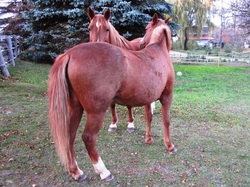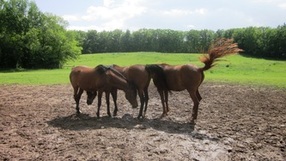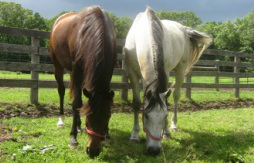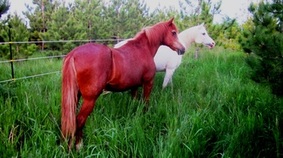The Importance of Socialization on Equine Behaviour

Horses prefer equine company and socialization can be considered an ethological need. Therefore keeping horses in groups for most of the day is preferable from a horse welfare aspect. An isolated horse feels vulnerable as it would naturally seek safety in numbers and studies have shown that horses are actually willing to perform 'work' in order to gain access to socialization.
Socialization shapes innate behaviour and social skills. It is particular important for young horses to be turned out with at least one 'older' horse that possesses these skills. The 'older' horse will shape the behaviour of the younger horses, which will also relate to behaviour towards humans, it's basically taught 'manners'.
Socialization is all about learning how to communicate with other horses. For younger horses this constant learning activates and develops brain function, which makes them easier to train later on. You may consider it pre-school.
Social interaction with other horses may be considered of utmost importance to the horse. Even though horses are highly adaptive to their environment, there are limits to which they can adapt to the circumstances they are placed in. If certain behaviours and behaviour patterns can not be performed, their welfare would certainly be at stake, as very little of their species-specific behaviour has changed through domestication.
Foremost, horses need to be able to see AND hear other horses and preferably also be able to have physical contact. Preferred allogrooming areas are withers, neck and croup and allogrooming in these areas lowers the heart rate.
Incompatible social partners could be a cause of chronic stress if housed in close proximity (like in a barn for instance), as horses have a complex social structure. Some consideration is required on how turnout groups are formed and how horses are introduced into an existing group. Some horses may be difficult to turnout in groups as they do not have the necessary social skills and therefore careful integration will be required.
Studies have shown that horses benefit greatly from socialization and with careful management even horses without much social skills can be socialized and not just mares and geldings, even stallions can be socialized in 'bachelor groups'. For more info on socialization of horses with limited social skills, click here.
Socialization shapes innate behaviour and social skills. It is particular important for young horses to be turned out with at least one 'older' horse that possesses these skills. The 'older' horse will shape the behaviour of the younger horses, which will also relate to behaviour towards humans, it's basically taught 'manners'.
Socialization is all about learning how to communicate with other horses. For younger horses this constant learning activates and develops brain function, which makes them easier to train later on. You may consider it pre-school.
Social interaction with other horses may be considered of utmost importance to the horse. Even though horses are highly adaptive to their environment, there are limits to which they can adapt to the circumstances they are placed in. If certain behaviours and behaviour patterns can not be performed, their welfare would certainly be at stake, as very little of their species-specific behaviour has changed through domestication.
Foremost, horses need to be able to see AND hear other horses and preferably also be able to have physical contact. Preferred allogrooming areas are withers, neck and croup and allogrooming in these areas lowers the heart rate.
Incompatible social partners could be a cause of chronic stress if housed in close proximity (like in a barn for instance), as horses have a complex social structure. Some consideration is required on how turnout groups are formed and how horses are introduced into an existing group. Some horses may be difficult to turnout in groups as they do not have the necessary social skills and therefore careful integration will be required.
Studies have shown that horses benefit greatly from socialization and with careful management even horses without much social skills can be socialized and not just mares and geldings, even stallions can be socialized in 'bachelor groups'. For more info on socialization of horses with limited social skills, click here.


